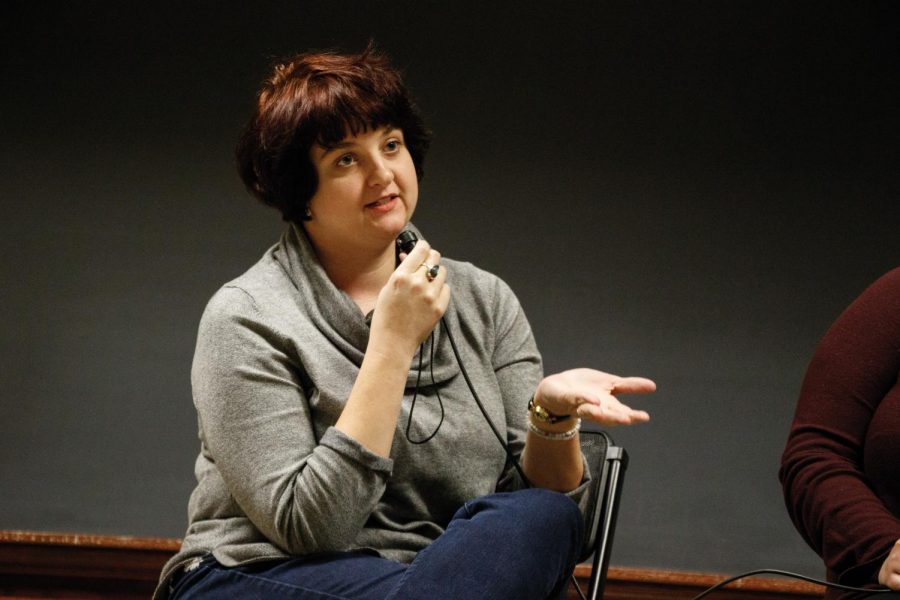Forum addresses NPR Illinois’ reporting on campus sexual misconduct
Rachel Otwell, NPR Illinois journalist and lead reporter for the ProPublica Local Reporting Network series, Campus Complicity, speaks at a forum on faculty sexual misconduct reforms at the Main Library on Tuesday.
Nov 20, 2019
NPR Illinois, ProPublica and Illinois Student Government hosted a forum to discuss faculty sexual misconduct reforms on Tuesday night.
This fall, students returned to campus to learn several professors and faculty members had been facing sexual harassment allegations, according to a ProPublica–NPR Illinois investigation. Last month, news broke that the University was demanding the NPR Illinois reporter, Rachel Otwell, report the identities of her anonymous student sources to the Title IX department at the University of Illinois System.
NPR Illinois, while independent, is licensed by the UI System, which makes Otwell and her coworkers University employees. Employees of the University are obligated to report incidents of sexual misconduct disclosed to them by students. But revealing sources’ identities directly conflicts with journalistic principles.
To avoid this, ProPublica, which is not affiliated with the University, will be handling interviews with new student sources who wish to remain anonymous. However, this method has hampered Otwell and her team from fulfilling the original purpose of the report, which she elaborated on at Tuesday’s forum.
“The lofty goal (of this investigation) is by shining a light, you know, these systems will be more navigable,” she said.
Get The Daily Illini in your inbox!
This idea was supported by the moderator of the panel, T. Christian Miller, a Pulitzer-winning journalist and ProPublica editor who has also covered sexual assault.
“Almost always the reason that survivors speak to me, whether they’re wartime survivors, sexual assault survivors, regular crime survivors, is because they are watching out for the person who is coming behind them,” he said.
Panelists discussed the possibility of NPR employees reporting to confidential advisers, who are not legally required to report to the Title IX department.
One of the panelists, Robin Kar, professor in Law, heads the Faculty Sexual Misconduct committee, which proposed 65 recommendations, encompassing preventative and advocacy measures to address sexual misconduct on campus. Kar stressed how increasing the number of accessible confidential advisors could greatly help survivors to come forward without fear of retaliation.
Sarah Colomé, another panelist and director of the Women’s Resources Center, said that the WRC currently has two part-time confidential advisors who are responsible for serving the needs of 50,000 students, as well as faculty and staff. But come December, they’ll be hiring their first full-time confidential adviser. These confidential advisers will be cross-placed at the cultural houses to be accessible to marginalized groups.
Colomé stressed the importance of student advocacy.
Ali Mirza, chief of staff for Illinois Student Government, and Sudarshana Rao, head of the organization Students Against Sexual Assault, represented the students’ voice on the panel. Both ISG and SASA unanimously supported the faculty misconduct recommendations. Mirza and Rao emphasized change begins with student collectivization — a testament Colomé reaffirmed.
“The answer to a lot of these questions which are so good is collaboration and community,” she said, “We need to stop doing this work in silos.”






